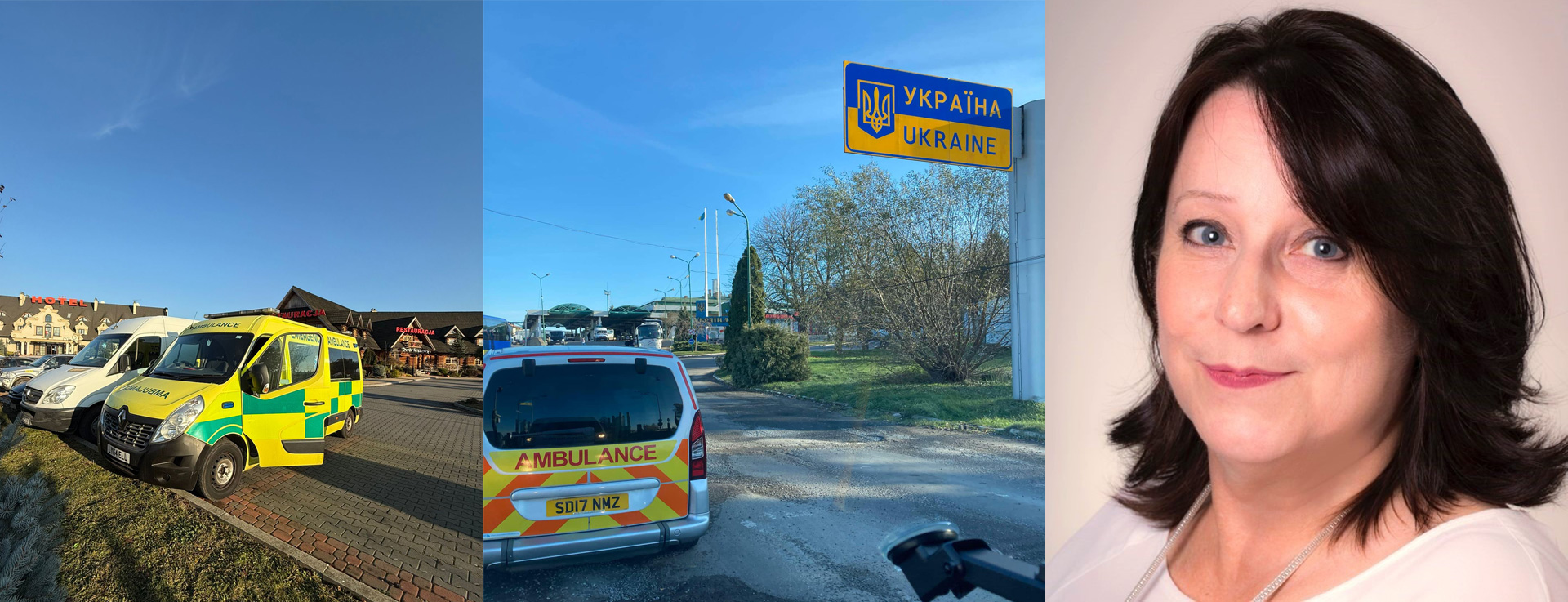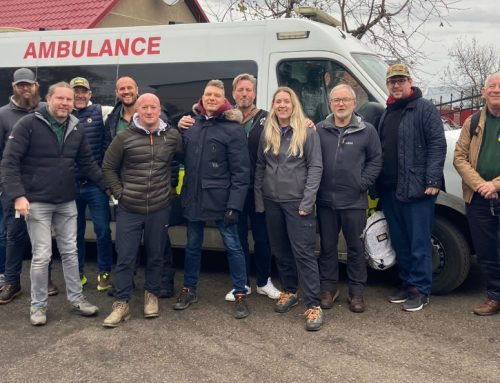It’s not often I can say this, but returning from Ukraine, I felt truly humbled and privileged.
In the first days of the war, I volunteered to help identify human rights abuses in Ukraine. The images I’ve geolocated ranged from burned out cars to executions. It’s horrifying, but necessary – all records are maintained by the Centre for Information Resilience, a huge catalogue of everything that’s happened in Ukraine. The press no longer report the details, but if you remember Bucha or Irpin, you’ll know what is continuing to happen in the settlements around the frontlines.
From that work, I’ve seen how similar Ukrainian culture is to ours and I’ve developed a real affinity for the country. It’s like the UK but on a vast scale. Rolling fields, green hills, rich history, and a deeply engrained culture. Its people, like us, just seek happiness in life with the desire to pass that happiness to their children. That is, at least should be, a fundamental human right.
So, when Adrian asked me earlier this year if I wanted to take his spot on a convoy of ambulances driving to Ukraine to deliver aid, I couldn’t refuse. It was a 1,300+ mile trip, 5 days, 6 countries, with strangers, driving a fully loaded (and massive) ambulance to a hospice and an orphanage in a war-torn country.
Our journey took us from Kent, through The Netherlands, Germany, Poland, and ultimately to Ukraine. The days were filled with camaraderie among strangers, creating experiences that will always bring a smile to my face. Like Nicole reversing a 7m long ambulance in the tightest space in a multi-story car park in Krakow. Or Faye telling a border guard he was wrong and making him eat humble pie. Amazing, strong, funny and intelligent women.
Those first 1,000 miles faded into insignificance as we reach the Ukrainian border. Here, there are posters of the atrocities happening across their country. The solemnity of what we’re doing and where we are hits home hard. The group I’m travelling with seems more hushed now, the buoyancy of the first few days fading into determination. I drive the first stretch from the border, passed Lviv and down into the southern part of Ukraine. The sun is setting in a glorious amber haze, with an orange moon rising over fields dotted with houses where wood smoke trickles from chimneys, scenting the small villages we drive through. This is a country I know – albeit not first hand – but from hundreds of images of incidents that changed lives forever. The roads, the trees, the flags, the shops – everything is eerily familiar and I can’t believe I’m here. As we drive through villages, there are rows upon rows of posters of young men who have lost their lives.
Our first stop is at a palliative care unit where we drop off medical supplies. The Ukrainian staff nod their appreciation, knowing we can’t understand them but their broad smiles tell us how grateful they are for the much needed help. Palliative care, like all health care, is depleted by the urgent needs on the frontline. We store everything in a cold, dark basement that doubles as an air raid shelter.
We stay the night in Ukraine, waiting for the almost inevitable warning sirens for incoming missiles. The night before our arrival, Ukraine suffered a huge missile and drone attack but not a single member of the group waivers in our goal, if anything the atmosphere is more resolute.
The following morning we take our ambulances to a children’s home. In this place they care for over 200 children, some orphaned by the war, and some refugees (with their mothers) from the front lines. These kids have lost everything, except hope and love. There’s the sound of little feet pattering around the buildings, buggies parked up under a shelter, brightly coloured wallpapers and crayon drawings from tiny hands. We’re given a tour of the facilities, and what is overwhelming is the love these children are receiving. This place isn’t just about physical care, there is a genuine aura of love in the air, as demonstrated by a small child nicknamed “The Boss” who’s inquisitive, affectionate, cheeky and greets us all with big “hellos”. A born entertainer, his disability seems to fuel rather than hinder him.
I’m pretty thick skinned, but I can feel tears creeping into my eyes. I have no right to cry, I’ve never suffered in my life as these children have suffered. But my heart strings are being tugged hard and despite the lack of language skills on my part, I want to communicate my affection. I sit down next to a young boy, maybe 6 or 7, who is blind and he immediately pulls himself into my lap and begins snuggling up. He’s happy and giggly, a testament to the environment he’s in and the nurses who care for him.
The doctor who runs the unit shows us around the critical care centre. Here are children from all over Ukraine. Many won’t survive. The unit is called the Butterfly unit, because – as the doctor explains – butterflies are beautiful but only with us a short time. As we trail in, there are photos on the wall with remembrance candles underneath for children already lost. Our fellow traveller, companion and translator, Stas, struggles to relay the doctor’s words to us. He can see we’re overwhelmed and it overwhelms him too.
We deliver what we’ve brought with us, beds, mattresses, clothes, and toys. As we leave, a group of children are heading into lunch. Part of our aid package is knitted teddies and the kids are all told they can pick one. Their excitement is tangible, if muted. There’s no squabbling – no pushing to get the largest or the ‘best’ teddy. There’s a small knitted green rabbit, very cute and something I would have bought for my own daughter when she was younger. A small boy picks it up and holds it to his heart. That’s not a toy that will be played with for an hour and then left to gather dust, it’s precious to him.
To everyone who donated time, money or goods to this trip, please know this. Each ambulance we were able to deliver will save a minimum of 10 children’s lives. Every item of clothing will find a grateful home. Every toy will be cherished. Every bed will be a safer place to sleep than the homes they have been forced to leave behind.
I’m amazed by the organisation and leadership of this trip and thank everyone who made it possible. What they are doing is amazing and I’m so grateful for having been able to be a part of it.






